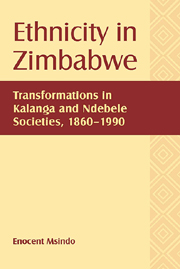Book contents
- Frontmatter
- Contents
- List of Illustrations
- Acknowledgments
- List of Abbreviations
- Note to the Reader
- Introduction
- 1 Ethnicity and Identities in Matabeleland
- 2 Domination and Resistance: Precolonial Ndebele and Kalanga Relations, 1860–93
- 3 Remaking Communities on the Margins: Chieftaincy and Ethnicity in Bulilima-Mangwe, 1893 to the 1950s
- 4 Ultraroyalism, King's Cattle, and Postconquest Politics among the Ndebele, 1893 to the 1940s
- 5 Language and Ethnicity in Matabeleland
- 6 Contests and Identities in Town: Bulawayo before 1960
- 7 Complementary or Competing? Ethnicity and Nationalism in Matabeleland, 1950–79
- 8 Postcolonial Terror: Politics, Violence, and Identity, 1980–90
- Conclusion
- Notes
- Selected Bibliography
- Index
- Rochester Studies in African History and the Diaspora
7 - Complementary or Competing? Ethnicity and Nationalism in Matabeleland, 1950–79
Published online by Cambridge University Press: 05 February 2013
- Frontmatter
- Contents
- List of Illustrations
- Acknowledgments
- List of Abbreviations
- Note to the Reader
- Introduction
- 1 Ethnicity and Identities in Matabeleland
- 2 Domination and Resistance: Precolonial Ndebele and Kalanga Relations, 1860–93
- 3 Remaking Communities on the Margins: Chieftaincy and Ethnicity in Bulilima-Mangwe, 1893 to the 1950s
- 4 Ultraroyalism, King's Cattle, and Postconquest Politics among the Ndebele, 1893 to the 1940s
- 5 Language and Ethnicity in Matabeleland
- 6 Contests and Identities in Town: Bulawayo before 1960
- 7 Complementary or Competing? Ethnicity and Nationalism in Matabeleland, 1950–79
- 8 Postcolonial Terror: Politics, Violence, and Identity, 1980–90
- Conclusion
- Notes
- Selected Bibliography
- Index
- Rochester Studies in African History and the Diaspora
Summary
Politics and Shifting Identities
There are two main problems with this period of colonial Zimbabwean history. The first has to do with sources. Although there is a general twenty-five-year embargo on archival material, it has taken much longer, for various reasons, for most of the sources in the Zimbabwean National Archives for the post-1960s years to be made fully accessible. On top of that, geting permission from the depositing government departments is also a challenge; and to complicate matters further, most ZAPU archives, which would have been useful, were destroyed in the early 1980s. Therefore, historians of Matabeleland must rely on oral evidence and a few sources located at various places and in several countries. The second problem is purely historiographical. There are just so many issues to research: from the strategies of the different political movements, which have been exaggerated in the telling by their respective leaders; to the military history of the liberation war, including guerrilla-peasant interactions; to the role of women in the struggle, the contradictions within the rank and file of the nationalist movements, and many more.
The goal of this chapter is not to restate or refine debates within the above issues, but to examine the intersection of these two main evolving identities—ethnicity and nationalism—with particular attention to the ways in which they complemented each other in the early phases of African nationalist development.
- Type
- Chapter
- Information
- Ethnicity in ZimbabweTransformations in Kalanga and Ndebele Societies, 1860-1990, pp. 179 - 210Publisher: Boydell & BrewerPrint publication year: 2012

